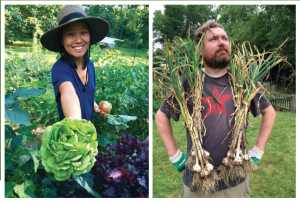
labor. (Photos courtesy of Assawaga farm).
Beginning farmers in Connecticut are changing the face of agriculture. With their values driven, sustainable-minded farming practices, they are filling the direct-to-consumer marketplace with high quality food grown intensively on small parcels. Since 2012, UConn Extension, part of the College of Agriculture, Health and Natural Resources, and its partners have responded to the growing number of beginning farmers with core training in production and business management. In recent years, it was clear that advanced-level beginning farmers (with 6-10 years of experience) were facing more complex challenges as they grappled with decisions about scale, diversification, infrastructure, and risk.
Starting this winter, UConn Extension and partners will respond to this emerging need with a new grant funded by U.S. Department of Agriculture’s National Institute of Food and Agriculture. The grant is Solid Ground 2: Weaving Together Expert Trainings and Peer Networks for Sustained Beginner and Advanced-Beginner Farmer Success in Connecticut. It is a three-year project funded at $525,000 that builds upon the accomplishments of the existing Solid Ground Training Program to deliver increasingly relevant, high quality trainings that respond to beginning farmer skill gaps at the appropriate level.
“The new grant leverages the capacity, talent, and integrity of partner organizations to meet the needs of beginning farmers that were unmet through our Solid Ground trainings in previous years,” says Jiff Martin, the Extension Educator leading the project. “We also intend to help address the very real barrier of finding farmland for new and beginning farmers, including the unique challenges created by structural racism when farmers of color seek farmland.”
While there are many excellent opportunities in agriculture, beginning farmers and ranchers have unique needs for education, training, and technical assistance. For those within their first 10 years of operation, it’s vital they have access to capital, land, and knowledge and information to help improve their operations’ profitability and sustainability.
“Beginning farmers can be divided into two groups – early-stage and advanced-level beginning farmers,” says Charlotte Ross, one of the project co-coordinators. “Slightly more than half (52%) of beginning farmer operators have been operating a farm for six to 10 years, and the remainder (48%) have been farming for five years or less.”
Beginning farmers comprise 28% of the principal operators on Connecticut farms, and there are 2,132 beginning farmers in total. The Solid Ground program is targeting 700 farms that earn between $2,500 and $50,000 individually. The average age of Connecticut’s beginning farmers is 47.9, only slightly higher than the national average of 46.3.
“While beginning farmer owned farm businesses are generating $97 million in product sales, only 32% can farm as a primary occupation, and most (79%) depend on off farm-income at varying levels. This is the reality of small farming enterprises in Connecticut—they are often part-time, seasonal businesses that generate tremendous value to our communities in terms of land stewardship and local food markets but are typically not at a scale to support multiple employees with fair wages and benefits.” Martin states. The next three years of the Solid Ground Program will help beginning farmers build critical peer networks with each other, gain insight on entrepreneurial models, discover cost-saving DIY infrastructure projects for the farm, and improve their skills in agroecology, agriculture mechanics, urban agriculture, and soil health.
UConn Extension and its partners will work together to deliver exceptional training and networking opportunities that are practical, convenient, and accessible. UConn Extension will serve as the administrative and communications foundation on the project. Two school-based agricultural education organizations will host Agriculture Mechanic trainings for beginning farmers. Front-line community-based organizations led by people of color will plan and deliver urban farming training in the cities of Bridgeport, Hartford, and New Haven. Two statewide non-government organizations with a strong base of beginning farmer members will work together to implement peer networking. A regional non-government organization will coordinate matchmaking events for farmland seekers. The structure of decision-making embedded throughout this project ensures that voices of color are empowered to steer training priorities.
Project leaders will strive to deliver services in a manner that ensures equitable access to learning opportunities. The project’s overall approach recognizes the integrity and new knowledge that the beginning farmer community, and the organizations they belong to, can offer to the broader agriculture sector in our state.
UConn Extension team members include Nancy Barrett, Matt DeBacco, Kip Kolesinskas, Charlotte Ross, Rebecca Toms, and MacKenzie White. Partner organizations on the project are Connecticut Northeast Organic Farming Association, Land For Good, Love Fed Initiative, the New Connecticut Farmer Alliance, Connecticut Farmland Trust, American Farmland Trust, the Connecticut Department of Agriculture, Green Village Initiative, the Keney Park Sustainability Project, Park City Harvest, the Nonnewaug High School Agri-Science program, the Rockville High School Agri-Science program, and the Connecticut Farm Bureau Young Farmers Committee.
UConn CAHNR Extension has more than 100 years’ experience strengthening communities in Connecticut and beyond. Extension programs address the full range of issues set forth in CAHNR’s strategic initiatives:
- Ensuring a vibrant and sustainable agricultural industry and food supply
- Enhancing health and well-being locally, nationally, and globally
- Designing sustainable landscapes across urban-rural interfaces
- Advancing adaptation and resilience in a changing climate.
Programs delivered by Extension reach individuals, communities, and businesses in each of Connecticut’s 169 municipalities.